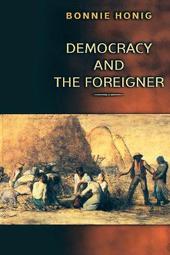
|
Democracy and the Foreigner
Paperback / softback
Main Details
| Title |
Democracy and the Foreigner
|
| Authors and Contributors |
By (author) Bonnie Honig
|
| Physical Properties |
| Format:Paperback / softback | | Pages:224 | | Dimensions(mm): Height 235,Width 152 |
|
| ISBN/Barcode |
9780691114767
|
| Classifications | Dewey:325.1 |
|---|
| Audience | | Professional & Vocational | | Tertiary Education (US: College) | |
|---|
|
Publishing Details |
| Publisher |
Princeton University Press
|
| Imprint |
Princeton University Press
|
| Publication Date |
2 February 2003 |
| Publication Country |
United States
|
Description
What should we do about foreigners? Should we try to make them more like us or keep them at bay to protect our democracy, our culture, our well-being? This dilemma underlies age-old debates about immigration, citizenship, and national identity that are strikingly relevant today. In Democracy and the Foreigner, Bonnie Honig reverses the question: What problems might foreigners solve for us? Hers is not a conventional approach. Instead of lauding the achievements of individual foreigners, she probes a much larger issue--the symbolic politics of foreignness. In doing so she shows not only how our debates over foreignness help shore up our national or democratic identities, but how anxieties endemic to liberal democracy themselves animate ambivalence toward foreignness. Central to Honig's arguments are stories featuring "foreign-founders," in which the origins or revitalization of a people depend upon a foreigner's energy, virtue, insight, or law.From such popular movies as The Wizard of Oz, Shane, and Strictly Ballroom to the biblical stories of Moses and Ruth to the myth of an immigrant America, from Rousseau to Freud, foreignness is represented not just as a threat but as a supplement for communities periodically requiring renewal. Why? Why do people tell stories in which their societies are dependent on strangers? One of Honig's most surprising conclusions is that an appreciation of the role of foreigners in (re)founding peoples works neither solely as a cosmopolitan nor a nationalist resource. For example, in America, nationalists see one archetypal foreign-founder--the naturalized immigrant--as reconfirming the allure of deeply held American values, whereas to cosmopolitans this immigrant represents the deeply transnational character of American democracy. Scholars and students of political theory, and all those concerned with the dilemmas democracy faces in accommodating difference, will find this book rich with valuable and stimulating insights.
Author Biography
Bonnie Honig is Professor of Political Science at Northwestern University and Senior Research Fellow at the American Bar Foundation. She is author of "Political Theory and the Displacement of Politics" and editor of "Feminist Interpretations of Hannah Arendt".
Reviews"Honig quite purposely twists the common question concerning whether immigration is good or bad... [She] provides a new take on foreignness and nation. Highly recommended."--Choice
|